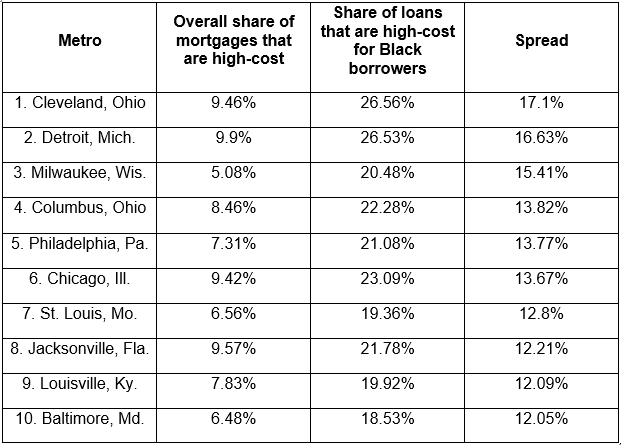Black home buyers are offered higher mortgage rates on average than the general population in every major metro area in the nation, a new study has found.
The study, conducted by LendingTree Vice President and Chief Economist Tendayi Kapfidze, found that Black homebuyers were more likely to receive high-cost purchase loans than the general population in all 50 of the nation’s largest metros.
“To demonstrate how the rates offered to Black homebuyers are often higher than rates offered to homebuyers of other races and ethnicities, we used data from the Home Mortgage Disclosure Act to look at the share of Black homebuyers and owners who received ‘high-cost’ mortgage purchase and refinance loans in 2019,” a LendingTree spokesperson said in an email to MPA.
A “high-cost” mortgage is a loan with an APR higher than the benchmark Average Prime Offer Rate (APOR) as defined by the Federal Financial Institutions Examination Council. The APOR changes depending on what rates are in a given period.
“In all 50 of the metros looked at in LendingTree’s study, Black homebuyers are more likely to receive high-cost purchase loans than the overall population,” Kapfidze wrote in the study. “The average spread between the overall share of high-cost mortgage loans and the share of high-priced mortgage loans for Black buyers is 8.99%.”
Cleveland, Detroit and Milwaukee had the widest spread between the overall share of high-cost mortgages and the share of high-cost mortgages taken out by Black borrowers, at an average of 16.4%. San Antonio, San Diego and San Jose, Calif., meanwhile, had the narrowest gap, with an average spread of 1.6%.
Black borrowers were also likelier than the general population to be offered high-cost refinances, the study found.
“For mortgage refinances, high-priced loans are less common but they do exist,” Kapfidze wrote. The spread between the overall share of high-cost refis and the share taken out by Black homeowners was widest in Kansas City, Mo., Phoenix, and Denver.
“In these metros, the average spread is 4.8%, which suggests that both Black and non-Black borrowers are unlikely to take out a high-cost refinance loan,” Kapfidze said. The study found only two metros where Black borrowers were less likely to receive a high-cost refi than other borrowers: Chicago and Detroit.
The imbalance between costs for Black and non-Black borrowers can becomes even more stark on a more granular level.
“On a county level, the disparity between the share of Black homebuyers and refinance borrowers and the share of the overall population who receive high-priced loans can be extreme,” Kapfidze wrote in the study. “In some counties, 100% of Black borrowers receive both high-cost purchase or refinance loans, even if those counties have relatively large Black populations.”
Black borrowers aren’t just paying more for loans on average – they’re less likely to be approved for a loan in the first place. According to a July analysis of HMDA data by Redfin, Black borrowers are more likely to be denied a mortgage than white borrowers in all 50 of the largest US metros. Nationally, nearly 16% of Black Americans who apply for a mortgage are rejected, while just 7% of white Americans who apply are rejected.
The metros with the largest spread between the overall share of high-cost mortgages and the share of high-cost loans taken out by Black borrowers are:

